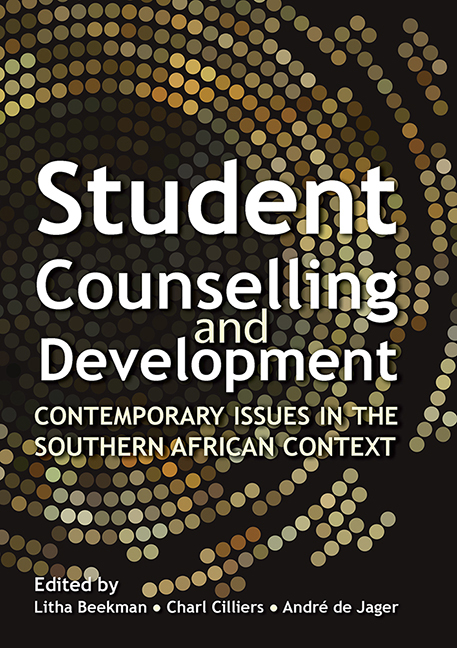Book contents
- Frontmatter
- Contents
- Figures
- Tables
- Preface
- Section 1 Development of Student Counselling and Development in Southern Africa
- Section 2 Theoretical Foundations of Student Counselling and Development in Higher Education
- Section 3 Services and Programmes Provided by Student Counselling and Development Units
- Section 4 Student Counselling and Development For Special Groups
- Section 5 Quality Assurance and Ethical and Professional Issues
- Contributors
- Index
Chapter 5 - Student Development Theory: An Overview
Published online by Cambridge University Press: 22 February 2020
- Frontmatter
- Contents
- Figures
- Tables
- Preface
- Section 1 Development of Student Counselling and Development in Southern Africa
- Section 2 Theoretical Foundations of Student Counselling and Development in Higher Education
- Section 3 Services and Programmes Provided by Student Counselling and Development Units
- Section 4 Student Counselling and Development For Special Groups
- Section 5 Quality Assurance and Ethical and Professional Issues
- Contributors
- Index
Summary
INTRODUCTION
In 1975 the American College Personnel Association (ACPA) celebrated its 50th birthday. In a paper delivered at the ACPA annual convention that year, Cross (1975, p.1) referred to the facilitation of student development as “a new profession” but which lay “in deep and not very clearly charted waters”. She commented on a lack of unanimity among the leaders at the time regarding the destination of student development. There were also disparities regarding the recommended routes to reach this destination. It appears from this that student development practice preceded the development of an accompanying theoretical base. It is also evident that student development is a relatively young discipline. In fact, student development has been a developing discipline in the United States (US) only since the 1950s and early 1960s when Nevitt Sanford published groundbreaking works such as The American College and Where Colleges Fail (McEwen, 2003). This was followed by the emergence of student development theories during the 1960s and through the 1990s. In the US postgraduate qualifications for student affairs professionals were subsequently established. Prospective and practicing Student Counselling and Development (SCD) practitioners are educated and trained in student development theory and its application through these programmes. As a result SCD in the US has attained full professional status, unlike the situation in South Africa.
The establishment of SCD in South Africa was described in Chapter 1. While the emergence of the SCD profession spans 60 years (see Chapter 1), its member association was established only 30 years ago (see Chapter 2). As was described in Chapters 1 and 2, various social and political factors played a meaningful part in the development of an SCD profession relevant to the needs of the African context. Practising members of the profession in the South African context needed to consider the role of social and political change in its underlying assumptions and theories. Consequently South African academics, student affairs staff and SCD practitioners are only now becoming engaged in the process of discovering and embracing the benefits of a theoretical base to inform their practice, research and teaching. Mergers among South African higher education (HE) institutions and a greater emphasis on quality assurance and accountability through institutional audits have provided impetus for many new initiatives.
- Type
- Chapter
- Information
- Student Counselling and DevelopmentContemporary issuesin the Southern African Context, pp. 87 - 105Publisher: University of South AfricaPrint publication year: 2012



